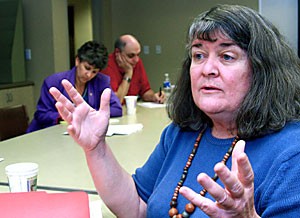A proposed $300 fee for journalism juniors and seniors – the result of an enrollment jump, increasing technology costs and faculty shortages – will be considered at November’s Arizona Board of Regents meeting.
The journalism department hopes a differential tuition surcharge will fatten an emaciated budget that has been starved by diminishing state funds, said Jacqueline Sharkey, journalism department head.
“”It’s clear that in this era of ongoing budget cuts that the college and departments’ budgets cannot cover all the expenses necessary to continue providing our students with a first-rate, professionally oriented education,”” Sharkey said.
The fee would raise money to help guarantee the future accreditation of the journalism department, which is vital to secure scholarships and competitions for students and job opportunities for graduates, Sharkey said.
That status could be in jeopardy if updated computer software and low student-to-instructor ratios aren’t maintained, Sharkey said.
“”The best teachers nationwide are not going to be interested in a program that’s not accredited,”” Sharkey said.
The department has 646 students under 12 full-time faculty – a 53-to-1 ratio. The department’s peer institutions range from 13-to-1 at the University of Missouri to 25-to-1 at the University of Maryland, Sharkey said.
The fee would funnel 90 percent of the funds back into students’ experiences in the program, such as new equipment in an overdue second computer room and more than $20,000 in need-based scholarships, Sharkey said.
“”We are confident that we can meet the needs of any student who finds the differential tuition to be a financial burden,”” Sharkey said.
Sharkey said the department’s financial strain is not a result of President Robert Shelton’s $10.3 million budget shuffling at the beginning of the semester, a point with which Shelton agreed.
“”The cuts I made in July were essential to just start to break even,”” Shelton said in an e-mail. “”So, they would not have an impact on any differential tuition considerations.””
The journalism department’s consideration of the surcharges must not be construed as the beginning of a cross-college trend, Shelton said.
“”We need to be very careful with differential tuition,”” Shelton wrote in an e-mail. “”There must be a clear justification such as added expenses to the program and potential earning power.””
Other UA programs, like engineering and architecture, already have a $300 differential tuition surcharge, while the Eller College of Management bumped theirs to $400.
That comparison has riled some journalism students, who point to the comparatively lower salaries they are likely to receive after graduation.
Upon graduation, many engineering students draw up to $40,000 annually, while journalism graduates average $28,000, according to the Wall Street Journal.
“”(Board of regents) rules (for surcharges) don’t say that you’ll make huge amounts of money out of college,”” Sharkey said. “”Differential tuition must provide employment
opportunities.””
While the proposal was announced last Wednesday via e-mails and handouts in every class, Sharkey said no students had asked any questions or voiced concerns as of Friday afternoon.
More likely was the idea that students would show up with questions during the first of three meetings scheduled to gauge students’ opinions on the surcharge, held at the Marshall building Monday night, Sharkey said.
But one student showed up for the meeting, which was attended by several department professors.
“”I hope that every student that has a concern comes to the meetings or contacts me, so that we can get as much student input as possible,”” Sharkey said. “”This really is an investment in their education.””
Abby Nelson, a journalism senior, said the meetings are of little interest to her.
Extra faculty members were promised long ago, when $50 surcharges were enacted on particular classes, Nelson said.
“”The input is that no one wants to pay it,”” Nelson said. “”It’s $300 that people don’t have. It’s hard enough paying for school as it is.””
Alex Blute, a journalism senior, said she attributes the meeting’s poor turnout to ambivalence rather than pure apathy.
“”It will be good for the department, as money rules everything,”” Blute said. “”But I think we all just gave up. There’s always something new, and most of these kids will ask mom and dad for more money anyway.””
The journalism surcharge will be voted on at the board of regents meeting Nov. 30. Tuition increases and course fees for the 2006-2007 school year will also be voted on during the meeting at the UA.









